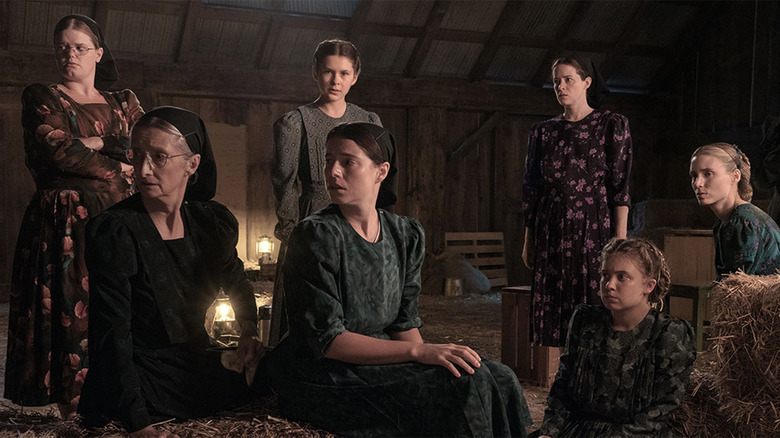Women Talking Review: Empowering Survivors To Take Back Their Lives [TIFF]
The following review includes reference to domestic abuse and sexual assault. Please proceed with caution.
In a world where abortion rights feel tenuous, men's sexual appetites endless, and domestic abuse cases ubiquitous, we need movies like "Women Talking." The confident, fearless film is a testament to female empowerment, depicting a colony of vulnerable women banding together to change their lives for the better — facing the unknown in order to improve the situation not just out of their own self-interest, but out of love for their fellow sisters in Christ. It's a beautifully shot, skillfully acted story that sends a powerful message about choosing a better future.
The film was written and directed by Sarah Polley, a Canadian storyteller with a knack for exploring broken relationships. Her films "Away From Her" and "Take This Waltz" are evocative, intimate portraits of domestic partnerships, interrupted by chance; the former centers on a long marriage disrupted by dementia, while the latter tackles the more mundane (and therefore more relatable) experience of falling out of love. "Women Talking" is the next stage for the filmmaker. It's a tightly written, smart, and surprisingly funny story that aches with love, pain, and longing that comes with any breakup — but here, an entire community is experiencing it all at once.
Polley's film is based on the Miriam Toews novel of the same name, which the New York Times called "a Mennonite #MeToo Novel." The story is a fictionalized account of the horrific, true events that happened in a Mennonite community in Bolivia. Women from all ages — even some young children — were drugged and raped while they slept in their beds. This occurred for far too long, with the women unable to stop the late-night intruders from violating them in what should be their safest, most private spaces. The biggest tragedy of the situation was the lack of recourse. Women weren't believed, with their stories being dismissed as "wild female imagination" or explained away as the act of demons or ghosts. The truth was much scarier.
Giving a voice to the voiceless
The film "Women Talking" features much the same storyline as Toews' novel. After one of the attackers is caught in the act, the Mennonite community is forced to face reality: Their men have been preying upon their women. Local law enforcement gets involved, and the female populace is left on their own as the men go into town to post bail. Deciding enough is enough, all the women use their "wild female imagination" to plan their next move communally. The bulk of "Women Talking" is the chosen representatives sitting in a hayloft deciding the best course of action for the group — and time is of the essence because whatever they decide will have to be put into action by the following sunrise.
Polley tackles the incredibly difficult subject matter in "Women Talking" with tact, grace, and ease. It would be all too tempting to lean into the lurid details, crafting a sexy, suspenseful thriller that exploits the real-life trauma for titillating entertainment. A lesser filmmaker may have resorted to stereotyping the Mennonites as backwards, delusional victims, indoctrinated by religious programming. Polley does neither, staying respectful both to Toews' novel and the real-life victims. "Women Talking" is an empowering film, set against the backdrop of abuse. It's a women's film, and fittingly, men are barely in it (with the exception of the "effeminate" schoolteacher August and the trans rape-survivor Melvin, played by August Winter). The story isn't about the men assaulting the women — it's about the women, finally, talking about the various systemic conditions that led to their current circumstance — and taking back their power in the process. Giving a voice to the voiceless.
I cannot imagine a better way to do this story, these people, justice.
A light in the darkness
Claire Foy is a force to be reckoned with as Salome in "Women Talking." Her maternal fury at the men for what they've done ignites her scenes; when Salome isn't barely containing her rage, she's desperately trying to hold herself together for her girls. The other standout performance here is Jessie Buckley as Mariche; she's angry too, but for her, the trauma runs much deeper. Rooney Mara as the dreamy, contemplative Ona was a welcome surprise and a much-needed counterpoint to Foy and Buckley, as was the adorable, grandmotherly Greta (Sheila McCarthy) and her charming stories about her horses, Cheryl and Ruth. All of these women — and the rest of the cast really — brought a lot of depth and nuance to the film's often dialogue-heavy scenes.
"Women Talking" is quietly steadfast and, at times, brutally honest. There's no glossing over or toning down the disgusting atrocities that occurred on this seemingly serene rural land. These women are strong, beautiful, resilient, intelligent, fierce — but they're also fragile, traumatized survivors of the most brutal, inhumane treatment imaginable. Blood stains on beds and nightgowns serve as a visual indicator of the immediate violence, while nervous habits, glassy eyes, and physical transformations (including a pregnancy) remind viewers of the long-term, persistent symptoms of this community's sickness. The assaults are only part of the problem in this isolated homestead where chauvinistic ideology dictates women not talk, not ask for help, not dare question their men. As one elder puts it: the livestock are treated better.
Polley created something remarkable with "Women Talking." It feels like an important film — but even as it's tackling this incredibly upsetting topic, there's an undercurrent of optimism and love that prioritizes humanizing these objectified women over reducing them to the transgressions acted upon them. Moments of levity and joy twinkle throughout the crackling, tense narrative, endearing the characters to us viewers. It's a fierce message against the oppressors, unapologetically feminist in reckoning against the patriarchy. This may be a movie about crimes committed within a Mennonite community, but its message is one we can apply to greater society as a whole.
/Film rating: 9 out of 10
If you or anyone you know has been a victim of sexual assault, help is available. Visit the Rape, Abuse & Incest National Network website or contact RAINN's National Helpline at 1-800-656-HOPE (4673).


